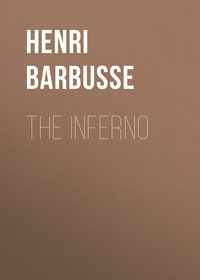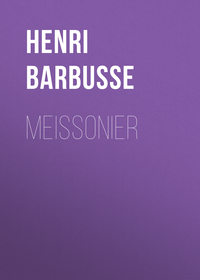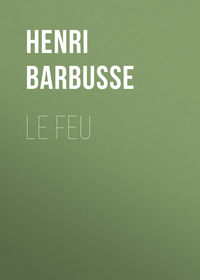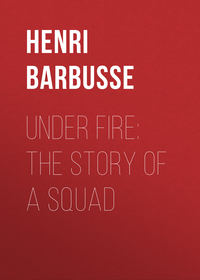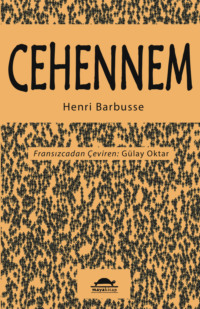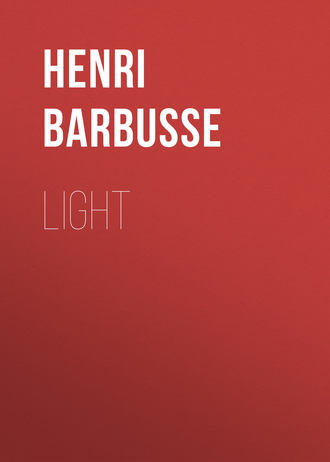 полная версия
полная версияLight
They have sent me into a listening post. To get there I had to worm myself, bent double, along a low and obstructed sap. In the first steps I was careful not to walk on the obstructions, and then I had to, and I dared. My foot trembled on the hard or supple masses which peopled that sap.
On the edge of the hole—there had been a road above it formerly, or perhaps even a market-place—the trunk of a tree severed near the ground arose, short as a grave-stone. The sight stopped me for a moment, and my heart, weakened no doubt by my physical destitution, kindled with pity for the tree become a tomb!
Two hours later I rejoined the section in its pit. We abide there, while the cannonade increases. The morning goes by, then the afternoon. Then it is evening.
They make us go into a wide dugout. It appears that an attack is developing somewhere. From time to time, through a breach contrived between sandbags so decomposed and oozing that they seem to have lived, we go out to a little winterly and mournful crossing, to look about. We consult the sky to determine the tempest's whereabouts. We can know nothing.
The artillery fire dazzles and then chokes up our sight. The heavens are making a tumult of blades.
Monuments of steel break loose and crash above our heads. Under the sky, which is dark as with threat of deluge, the explosions throw livid sunshine in all directions. From one end to the other of the visible world the fields move and descend and dissolve, and the immense expanse stumbles and falls like the sea. Towering explosions in the east, a squall in the south; in the zenith a file of bursting shrapnel like suspended volcanoes.
The smoke which goes by, and the hours as well, darken the inferno. Two or three of us risk our faces at the earthen cleft and look out, as much for the purpose of propping ourselves against the earth as for seeing. But we see nothing, nothing on the infinite expanse which is full of rain and dusk, nothing but the clouds which tear themselves and blend together in the sky, and the clouds which come out of the earth.
Then, in the slanting rain and the limitless gray, we see a man, one only, who advances with his bayonet forward, like a specter.
We watch this shapeless being, this thing, leaving our lines and going away yonder.
We only see one—perhaps that is the shadow of another, on his left.
We do not understand, and then we do. It is the end of the attacking wave.
What can his thoughts be—this man alone in the rain as if under a curse, who goes upright away, forward, when space is changed into a shrieking machine? By the light of a cascade of flashes I thought I saw a strange monk-like face. Then I saw more clearly—the face of an ordinary man, muffled in a comforter.
"It's a chap of the 150th, not the 129th," stammers a voice by my side.
We do not know, except that it is the end of the attacking wave.
When he has disappeared among the eddies, another follows him at a distance, and then another. They pass by, separate and solitary, delegates of death, sacrificers and sacrificed. Their great-coats fly wide; and we, we press close to each other in our corner of night; we push and hoist ourselves with our rusted muscles, to see that void and those great scattered soldiers.
We return to the shelter, which is plunged in darkness. The motor-cyclist's voice obtrudes itself to the point that we think we can see his black armor. He is describing the "carryings on" at Bordeaux in September, when the Government was there. He tells of the festivities, the orgies, the expenditure, and there is almost a tone of pride in the poor creature's voice as he recalls so many pompous pageants all at once.
But the uproar outside silences us. Our funk-hole trembles and cracks. It is the barrage—the barrage which those whom we saw have gone to fight, hand to hand. A thunderbolt falls just at the opening, it casts a bright light on all of us, and reveals the last emotion of all, the belief that all was ended! One man is grimacing like a malefactor caught in the act; another is opening strange, disappointed eyes; another is swinging his doleful head, enslaved by the love of sleep, and another, squatting with his head in his hands, makes a lurid entanglement. We have seen each other—upright, sitting or crucified—in the second of broad daylight which came into the bowels of the earth to resurrect our darkness.
In a moment, when the guns chance to take breath, a voice at the door-hole calls us:
"Forward!"
"We shall be staying there, this time over!" growl the men.
They say this, but they do not know it. We go out, into a chaos of crashing and flames.
"You'd better fix bayonets," says the sergeant; "come, get 'em on."
We stop while we adjust weapon to weapon and then run to overtake the rest.
We go down; we go up; we mark time; we go forward—like the others. We are no longer in the trench.
"Get your heads down—kneel!"
We stop and go on our knees. A star-shell pierces us with its intolerable gaze.
By its light we see, a few steps in front of us, a gaping trench. We were going to fall into it. It is motionless and empty—no, it is occupied—yes, it is empty. It is full of a file of slain watchers. The row of men was no doubt starting out of the earth when the shell burst in their faces; and by the poised white rays we see that the blast has staved them in, has taken away the flesh; and above the level of the monstrous battlefield there is left of them only some fearfully distorted heads. One is broken and blurred; one emerges like a peak, a good half of it fallen into nothing. At the end of the row, the ravages have been less, and only the eyes are smitten. The hollow orbits in those marble heads look outwards with dried darkness. The deep and obscure face-wounds have the look of caverns and funnels, of the shadows in the moon; and stars of mud are clapped on the faces in the place where eyes once shone.
Our strides have passed that trench. We go more quickly and trouble no more now about the star-shells, which, among us who know nothing, say, "I know" and "I will." All is changed, all habits and laws. We march exposed, upright, through the open fields. Then I suddenly understand what they have hidden from us up to the last moment—we are attacking!
Yes, the counter-attack has begun without our knowing it. I apply myself to following the others. May I not be killed like the others; may I be saved like the others! But if I am killed, so much the worse.
I bear myself forward. My eyes are open but I look at nothing; confused pictures are printed on my staring eyes. The men around me form strange surges; shouts cross each other or descend. Upon the fantastic walls of nights the shots make flicks and flashes. Earth and sky are crowded with apparitions; and the golden lace of burning stakes is unfolding.
A man is in front of me, a man whose head is wrapped in linen.
He is coming from the opposite direction. He is coming from the other country! He was seeking me, and I was seeking him. He is quite near—suddenly he is upon me.
The fear that he is killing me or escaping me—I do not know which—makes me throw out a desperate effort. Opening my hands and letting the rifle go, I seize him. My fingers are buried in his shoulder, in his neck, and I find again, with overflowing exultation, the eternal form of the human frame. I hold him by the neck with all my strength, and with more than all my strength, and we quiver with my quivering.
He had not the idea of dropping his rifle so quickly as I. He yields and sinks. I cling to him as if it were salvation. The words in his throat make a lifeless noise. He brandishes a hand which has only three fingers—I saw it clearly outlined against the clouds like a fork.
Just as he totters in my arms, resisting death, a thunderous blow strikes him in the back. His arms drop, and his head also, which is violently doubled back, but his body is hurled against me like a projectile, like a superhuman blast.
I have rolled on the ground; I get up, and while I am hastily trying to find myself again I feel a light blow in the waist. What is it? I walk forward, and still forward, with my empty hands. I see the others pass, they go by in front of me. I, I advance no more. Suddenly I fall to the ground.
* * * * * *CHAPTER XIV
THE RUINS
I fall on my knees, and then full length. I do what so many others have done.
I am alone on the earth, face to face with the mud, and I can no longer move. The frightful searching of the shells alights around me. The hoarse hurricane which does not know me is yet trying to find the place where I am!
Then the battle goes away, and its departure is heartrending. In spite of all my efforts, the noise of the firing fades and I am alone; the wind blows and I am naked.
I shall remain nailed to the ground. By clinging to the earth and plunging my hands into the depth of the swamp as far as the stones, I get my neck round a little to see the enormous burden that my back supports. No—it is only the immensity on me.
My gaze goes crawling. In front of me there are dark things all linked together, which seem to seize or to embrace one another. I look at those hills which shut out my horizon and imitate gestures and men. The multitude downfallen there imprisons me in its ruins. I am walled in by those who are lying down, as I was walled in before by those who stood.
I am not in pain. I am extraordinarily calm; I am drunk with tranquillity. Are they dead, all—those? I do not know. The dead are specters of the living, but the living are specters of the dead. Something warm is licking my hand. The black mass which overhangs me is trembling. It is a foundered horse, whose great body is emptying itself, whose blood is flowing like poor touches of a tongue on to my hand. I shut my eyes, bemused, and think of a bygone merry-making; and I remember that I once saw, at the end of a hunt, against the operatic background of a forest, a child-animal whose life gushed out amid general delight.
A voice is speaking beside me.
No doubt the moon has come out—I cannot see as high as the cloud escarpments, as high as the sky's opening. But that blenching light is making the corpses shine like tombstones.
I try to find the low voice. There are two bodies, one above the other. The one underneath must be gigantic—his arms are thrown backward in a hurricane gesture; his stiff, disheveled hair has crowned him with a broken crown. His eyes are opaque and glaucous, like two expectorations, and his stillness is greater than anything one may dream of. On the other the moon's beams are setting points and lines a-sparkle and silvering gold. It is he who is talking to me, quietly and without end. But although his low voice is that of a friend, his words are incoherent. He is mad—I am abandoned by him! No matter, I will drag myself up to him to begin with. I look at him again. I shake myself and blink my eyes, so as to look better. He wears on his body a uniform accursed! Then with a start, and my hand claw-wise, I stretch myself towards the glittering prize to secure it. But I cannot go nearer him; it seems that I no longer have a body. He has looked at me. He has recognized my uniform, if it is recognizable, and my cap, if I have it still. Perhaps he has recognized the indelible seal of my race that I carry printed on my features. Yes, on my face he has recognized that stamp. Something like hatred has blotted out the face that I saw dawning so close to me. Our two hearts make a desperate effort to hurl ourselves on each other. But we can no more strike each other than we can separate ourselves.
But has he seen me? I cannot say now. He is stirred by fever as by the wind; he is choked with blood. He writhes, and that shows me the beaten-down wings of his black cloak.
Close by, some of the wounded have cried out; and farther away one would say they are singing—beyond the low stakes so twisted and shriveled that they look as if guillotined.
He does not know what he is saying. He does not even know that he is speaking, that his thoughts are coming out. The night is torn into rags by sudden bursts; it fills again at random with clusters of flashes; and his delirium enters into my head. He murmurs that logic is a thing of terrible chains, and that all things cling together. He utters sentences from which distinct words spring, like the scattered hasty gleams they include in hymns—the Bible, history, majesty, folly. Then he shouts:—
"There is nothing in the world but the Empire's glory!"
His cry shakes some of the motionless reefs. And I, like an invincible echo, I cry:—
"There is only the glory of France!"
I do not know if I did really cry out, and if our words did collide in the night's horror. His head is quite bare. His slender neck and bird-like profile issue from a fur collar. There are things like owls shining on his breast. It seems to me as if silence is digging itself into the brains and lungs of the dark prisoners who imprison us, and that we are listening to it.
He rambles more loudly now, as if he bore a stifling secret; he calls up multitudes, and still more multitudes. He is obsessed by multitudes—"Men, men!" he says. The soil is caressed by some sounds of sighs, terribly soft, by confidences which are interchanged without their wishing it. Now and again, the sky collapses into light, and that flash of instantaneous sunshine changes the shape of the plain every time, according to its direction. Then does the night take all back again athwart the rolling echoes.
"Men! Men!"
"What about them, then?" says a sudden jeering voice which falls like a stone.
"Men must not awake," the shining shadow goes on, in dull and hollow tones.
"Don't worry!" says the ironical voice, and at that moment it terrifies me.
Several bodies arise on their fists into the darkness—I see them by their heavy groans—and look around them.
The shadow talks to himself and repeats his insane words:—
"Men must not awake."
The voice opposite me, capsizing in laughter and swollen with a rattle, says again:—
"Don't worry!"
Yonder, in the hemisphere of night, comets glide, blending their cries of engines and owls with their flaming entrails. Will the sky ever recover the huge peace of the sun and the stainless blue?
A little order, a little lucidity are coming back into my mind. Then I begin to think about myself.
Am I going to die, yes or no? Where can I be wounded? I have managed to look at my hands, one by one; they are not dead, and I saw nothing in their dark trickling. It is extraordinary to be made motionless like this, without knowing where or how. I can do no more on earth than lift my eyes a little to the edge of the world where I have rolled.
Suddenly I am pushed by a movement of the horse on which I am lying. I see that he has turned his great head aside; he is mournfully eating grass. I saw this horse but lately in the middle of the regiment—I know him by the white in his mane—rearing and whinnying like the true battle-chargers; and now, broken somewhere, he is silent as the truly unhappy are. Once again, I recall the red deer's little one, mutilated on its carpet of fresh crimson, and the emotion which I had not on that bygone day rises into my throat. Animals are innocence incarnate. This horse is like an enormous child, and if one wanted to point out life's innocence face to face, one would have to typify, not a little child, but a horse. My neck gives way, I utter a groan, and my face gropes upon the ground.
The animal's start has altered my place and shot me on my side, nearer still to the man who was talking. He has unbent, and is lying on his back. Thus he offers his face like a mirror to the moon's pallor, and shows hideously that he is wounded in the neck. I feel that he is going to die. His words are hardly more now than the rustle of wings. He has said some unintelligible things about a Spanish painter, and some motionless portraits in the palaces—the Escurial, Spain, Europe. Suddenly he is repelling with violence some beings who are in his past:—
"Begone, you dreamers!" he says, louder than the stormy sky where the flames are red as blood, louder than the falling flashes and the harrowing wind, louder than all the night which enshrouds us and yet continues to stone us.
He is seized with a frenzy which bares his soul as naked as his neck:—
"The truth is revolutionary," gasps the nocturnal voice; "get you gone, you men of truth, you who cast disorder among ignorance, you who strew words and sow the wind; you contrivers, begone! You bring in the reign of men! But the multitude hates you and mocks you!"
He laughs, as if he heard the multitude's laughter.
And around us another burst of convulsive laughter grows hugely bigger in the plain's black heart:—
"Wot's 'e sayin' now, that chap?"
"Let him be. You can see 'e knows more'n 'e says."
"Ah, la, la!"
I am so near to him that I alone gather the rest of his voice, and he says to me very quietly:—
"I have confidence in the abyss of the people."
And those words stabbed me to the heart and dilated my eyes with horror, for it seemed to me suddenly, in a flash, that he understood what he was saying! A picture comes to life before my eyes—that prince, whom I saw from below, once upon a time, in the nightmare of life, he who loved the blood of the chase. Not far away a shell turns the darkness upside down; and it seems as if that explosion also has considered and shrieked.
Heavy night is implanted everywhere around us. My hands are bathed in black blood. On my neck and cheeks, rain, which is also black, bleeds.
The funeral procession of silver-fringed clouds goes by once more, and again a ray of moonlight besilvers the swamp that has sunk us soldiers; it lays winding-sheets on the prone.
All at once a swelling lamentation comes to life, one knows not where, and glides over the plain:—
"Help! Help!"
"Now then! They're not coming to look for us! What about it?"
And I see a stirring and movement, very gentle, as at the bottom of the sea.
Amid the glut of noises, upon that still tepid and unsubmissive expanse where cold death sits brooding, that sharp profile has fallen back. The cloak is quivering. The great and sumptuous bird of prey is in the act of taking wing.
The horse has not stopped bleeding. Its blood falls on me drop by drop with the regularity of a clock,—as though all the blood that is filtering through the strata of the field and all the punishment of the wounded came to a head in him and through him. Ah, it seems that truth goes farther in all directions than one thought! We bend over the wrong that animals suffer, for them we wholly understand.
Men, men! Everywhere the plain has a mangled outline. Below that horizon, sometimes blue-black and sometimes red-black, the plain is monumental!
CHAPTER XV
AN APPARITION
I have not changed my place. I open my eyes. Have I been sleeping? I do not know. There is tranquil light now. It is evening or morning. My arms alone can tremble. I am enrooted like a distorted bush. My wound? It is that which glues me to the ground.
I succeed in raising my face, and the wet waves of space assail my eyes. Patiently I pick out of the earthy pallor which blends all things some foggy shoulders, some cloudy angles of elbows, some hand-like lacerations. I discern in the still circle which encloses me—faces lying on the ground and dirty as feet, faces held out to the rain like vases, and holding stagnant tears.
Quite near, one face is looking sadly at me, as it lolls to one side. It is coming out of the bottom of the heap, as a wild animal might. Its hair falls back like nails. The nose is a triangular hole and a little of the whiteness of human marble dots it. There are no lips left, and the two rows of teeth show up like lettering. The cheeks are sprinkled with moldy traces of beard. This body is only mud and stones. This face, in front of my own, is only a consummate mirror.
Water-blackened overcoats cover and clothe the whole earth around me.
I gaze, and gaze–
I am frozen by a mass which supports me. My elbow sinks into it. It is the horse's belly; its rigid leg obliquely bars the narrow circle from which my eyes cannot escape. Ah, it is dead! It seems to me that my breast is empty, yet still there is an echo in my heart. What I am looking for is life.
The distant sky is resonant, and each dull shot comes and pushes my shoulder. Nearer, some shells are thundering heavily. Though I cannot see them, I see the tawny reflection that their flame spreads abroad, and the sudden darkness as well that is hurled by their clouds of excretion. Other shadows go and come on the ground about me; and then I hear in the air the plunge of beating wings, and cries so fierce that I feel them ransack my head.
* * * * * *Death is not yet dead everywhere. Some points and surfaces still resist and budge and cry out, doubtless because it is dawn; and once the wind swept away a muffled bugle-call. There are some who still burn with the invisible fire of fever, in spite of the frozen periods they have crossed. But the cold is working into them. The immobility of lifeless things is passing into them, and the wind empties itself as it goes by.
Voices are worn away; looks are soldered to their eyes. Wounds are staunched; they have finished. Only the earth and the stones bleed. And just then I saw, under the trickling morning, some half-open but still tepid dead that steamed, as if they were the blackening rubbish-heap of a village. I watch that hovering dead breath of the dead. The crows are eddying round the naked flesh with their flapping banners and their war-cries. I see one which has found some shining rubies on the black vein-stone of a foot; and one which noisily draws near to a mouth, as if called by it. Sometimes a dead man makes a movement, so that he will fall lower down. But they will have no more burial than if they were the last men of all.
* * * * * *There is one upright presence which I catch a glimpse of, so near, so near; and I want to see it. In making the effort with my elbow on the horse's ballooned body I succeed in altering the direction of my head, and of the corridor of my gaze. Then all at once I discover a quite new population of bronze men in rotten clothes; and especially, erect on bended knees, a gray overcoat, lacquered with blood and pierced by a great hole, round which is collected a bunch of heavy crimson flowers. Slowly I lift the burden of my eyes to explore that hole. Amid the shattered flesh, with its changing colors and a smell so strong that it puts a loathsome taste in my mouth, at the bottom of the cage where some crossed bones are black and rusted as iron bars, I can see something, something isolated, dark and round. I see that it is a heart.
Placed there, too—I do not know how, for I cannot see the body's full height—the arm, and the hand. The hand has only three fingers—a fork– Ah, I recognize that heart! It is his whom I killed. Prostrate in the mud before him, because of my defeat and my resemblance, I cried out to the man's profundity, to the superhuman man. Then my eyes fell; and I saw worms moving on the edges of that infinite wound. I was quite close to their stirring. They are whitish worms, and their tails are pointed like stings; they curve and flatten out, sometimes in the shape of an "i," and sometimes of a "u." The perfection of immobility is left behind. The human material is crumbled into the earth for another end.
I hated that man, when he had his shape and his warmth. We were foreigners, and made to destroy ourselves. Yet it seems to me, in face of that bluish heart, still attached to its red cords, that I understand the value of life. It is understood by force, like a caress. I think I can see how many seasons and memories and beings there had to be, yonder, to make up that life,—while I remain before him, on a point of the plain, like a night watcher. I hear the voice that his flesh breathed while yet he lived a little, when my ferocious hands fumbled in him for the skeleton we all have. He fills the whole place. He is too many things at once. How can there be worlds in the world? That established notion would destroy all.
This perfume of a tuberose is the breath of corruption. On the ground, I see crows near me, like hens.
Myself! I think of myself, of all that I am. Myself, my home, my hours; the past, and the future,—it was going to be like the past! And at that moment I feel, weeping within me and dragging itself from some little bygone trifle, a new and tragical sorrow in dying, a hunger to be warm once more in the rain and the cold: to enclose myself in myself in spite of space, to hold myself back, to live. I called for help, and then lay panting, watching the distance in desperate expectation. "Stretcher-bearers!" I cry. I do not hear myself; but if only the others heard me!


